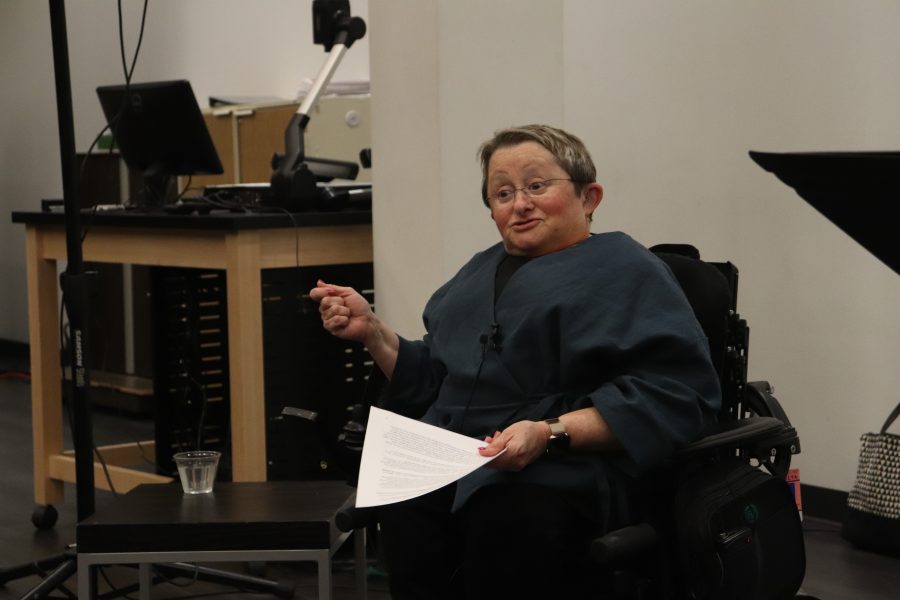Featured image: Karen Braitmayer gives a lecture about disabilities and possible career tracks. Jacky Chen | The Falcon
On April 25, Seattle Pacific University awarded AIA (American Institute of Architecture) fellow Karen Braitmayer the No Limits, No Boundaries Award at the No Limits, No Boundaries event.
The award was originally created by SPU to honor an individual of the year whose life work and spirit demonstrate a commitment to access, inclusion and reconciliation within the community and outward.
Braitmayer has been a well-known local architect for over 30 years, and is the founder of Seattle-based architectural consulting firm Studio Pacific, who now specializes only in accessibility consulting.
Studio Pacific’s motto is, “everyone deserves to live their best, barrier-free life.”
Braitmayer is a lifelong wheelchair user that specializes in accessible design and helps advise others — such as school districts, companies and hospitals — in accessible specific design.
In Nickerson studios, a packed house eagerly arrived for a disabled student’s testimonial and main speaker Braitmayer.
The assistant director of Disability Support Services, Annabell DuMez-Matheson, opened the event with an overview of her role, in which she meets with students to help accommodate any special needs physically or mentally throughout their academic career.
However, Matheson summed up why it was so critical to have such influential speakers for the event in one sentence, “As a campus we are not in the place of universal design yet.”
As a member of the disabled community herself, Braitmayer’s entire life has been dedicated to universal design. Matheson explained that the architect brought the wisdom and experience to give unique insight for this event.
Braitmayer captivated the audience by discussing her journey through college and how her experience shapes how she changes the world today.
Braitmayer discussed originally attending undergraduate for sociology, but after taking an aptitude test discovered a newfound love for architecture and pursued it through a master’s program.
Laughter and smiles filled the room as she talked about her classmates building home-made table tops, and illegally spray painting parking spaces, all to accommodate her throughout her time in the graduate program.
The acts helped Braitmayer realize her passion for universal design.
She explained that design has become stagnant, because while some accommodations are made for people with disabilities the majority are still being built in a world where the majority are able-bodied.
However, she argues that universal design should truly just be the design standard for all.
“Disability does not discriminate, and sooner or later you or someone you know will have a disability that will have to be accommodated for,” Braitmayer said.
Another testimony was given by Whitney Morean, an SPU Ph.D. student studying clinical psychology.
When Morean was 28, she suffered from an unexpected stroke that left her physically disabled, and the story of her event left several audience members in tears or holding hands with neighboring attendees for support.
Morean’s personal experience as an SPU student has allowed her to see the daily challenges our school presents like hundreds of stairs, high curbs and increased traffic.
“Even just walking to the event today was a challenge. … There is no direct pathway to the studio, and the intersection at Nickerson does not accommodate for slow walking or easy transitions.”
But what she wanted attendants to take away most was how this tragedy gave her new purpose for her passion, now wanting to specialize in clinical work involving disability rehabilitation and accommodation.
Morean states, “I have a unique perspective as an able bodied person for 28 years that has been mostly ignorant of the challenges my physical disability now presents me with.
This circumstance has helped inspire my path, but I recognize in addition to my clinical interests I want to use my voice for disability advocacy and awareness, which is why I am sharing publicly tonight.”
Morean’s speech received roaring applause and transitioned into SPU instructor of interior design and personal friend of Braitmayer, Lisa Blanchard, giving Morean a hug and applause as she herself took the stage.
Blanchard opened her time up by discussing why people like Morien and Braitmayer are actually big reasons why universal design is so critical in our world.
She discussed taking students yearly into Braitmayer’s house to demonstrate just what universal design, actually looks like.
She explained that on the first day of class she asks her students, “Who do you want to design for?” and typically, all students reply with “everyone.” She uses Braitmayer’s house as a way to show them that everyone is not what they typically thought.
Braitmayer summed up her own mission and the entire night in one statement, “You do not have to be a person of disability to be an ally.”
Although architecture, policies and protection have come a long way, Braitmayer’s discussion of her own daughter’s hardships sparked a lot of agreement and consensus in the audience.
Braitmayer asked her own daughter, a Western Washington University student and wheelchair user, what annoyed her the most about college.
Braitmayer’s daughter explained that she cannot attend club fairs because the clubs place tables on the accessible concrete pathways instead of the grass. She also does not like making food in the student union because the microwave is above her head and she is afraid of severe burning from spillage.
Braitmayer points out that these challenges are not even architectural obstacles and could be easily fixed. “Sometimes it is simple changes that can make a huge impact to make everyone feel included because it isn’t always about changing a building.”
Braitmayer reasons that as an ally there are small things that can always be done. Anybody can help make an environment more inclusive, and help with challenges that people with disabilities still regularly face in order to shape the future.

















































































